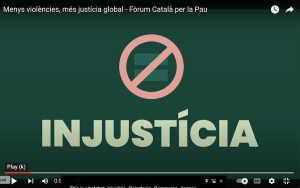.. DEMOCRATIC PARTICIPATION ..
An article from the Instituto Catalan Internacional para la Paz
The Catalan Forum for Peace was publicly presented this Wednesday, February 14, within the framework of the Second Day of Peace held in the Parliament of Catalonia. The forum is a participatory process of reflection and debate that was born with a double objective: to create a public peace policy in Catalonia and to reinforce the agendas and social and political advocacy capacities of Catalan peace organizations.

screenshot from their website
The Catalan Forum for Peace is an initiative promoted by the Government of Catalonia, the Catalan Council for the Promotion of Peace, the ICIP and the Catalan associative network for the promotion of peace. It arises, therefore, from social and institutional collaboration, and will be developed throughout 2024 and 2025. The Forum will consist of a process of citizen participation based on five axes of debate: Culture of peace; Security and justice; Armed conflicts; Global challenges; Women, peace and security.
Coinciding with the public presentation, the website www.forumcatalapau.cat has been inaugurated, from which the participation of citizens, entities and institutions committed to the values of the culture of peace and social justice will be encouraged.
“For a public policy of peace”
The public presentation of the Catalan Forum for Peace was made during the celebration of the II Peace Day of the Parliament of Catalonia, co-organized by the Catalan chamber, the ICIP and Lafede.cat. With the title “For a public policy of peace”, the conference brought together representatives of numerous peace organizations and experts in the field of research and work for peace, as well as representatives of the Government and several city councils. and institutions.
(continued in right column)
(Click here for the Spanish original of this article)
The culture of peace at a regional level, Does it have advantages compared to a city level?
(continued from left column)
At the opening of the day, the vice president of the Catalan Council for the Promotion of Peace and director of the ICIP, Kristian Herbolzheimer, called on the Catalan institutions and entities committed to the values of the culture of peace and social justice to join the Catalan Forum for Peace: “it is time to open the reflection on how we understand a Catalonia in peace and on how we can contribute, from Catalonia, to peace in the world. It is time to tell each other, meet and explain to all the people, groups and institutions that we share the values of the culture of peace and that we share the commitment to a more just and supportive world.”
For her part, the president of Lafede.cat, Arés Perceval , highlighted that the Catalan Forum for Peace must allow “the design of a public peace policy endorsed by all parliamentary groups, a pending subject” and added that the process also “It has to serve us to strengthen the movement for peace and nonviolence that we lead from civil society.”
The day was inaugurated by the president of the Parliament of Catalonia, Anna Erra , who highlighted the tradition of promoting peace in Catalonia, a “country of peace” that “has not hesitated to embrace the values of democracy and freedoms.” fundamental.” In her intervention, Erra predicted that the Catalan Forum for Peace will help strengthen the culture of peace, “become a useful tool for the international community,” and “shape some responses based on the collective intelligence of the country.”
The day included two round tables: the first focused on the challenges and opportunities for peace in the context of global threats, and the second was dedicated to the five axes of debate that will guide the Catalan Forum for Peace. when the participatory process begins, in the month of April. Carme Colomina , CIDOB researcher ; Luca Gervasoni , director of NOVACT; Maria Josep Parés , consultant; Jesús Vinyes , president of the School Council of Catalonia; Nora Miralles , president of the Delàs Center; Albert Caramés , director of FundiPau; Jordi Armadans , journalist and political scientist; and Blanca Camps , researcher at the Autonomous University of Barcelona.
– – –
If you wish to make a comment on this article, you may write to coordinator@cpnn-world.org with the title “Comment on (name of article)” and we will put your comment on line. Because of the flood of spam, we have discontinued the direct application of comments.